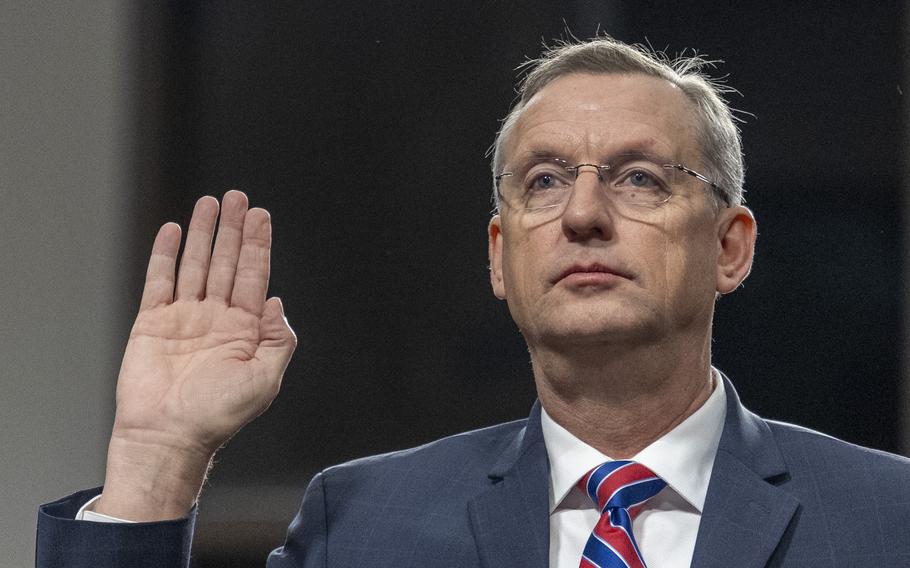
Doug Collins takes an oath on Tuesday, Jan. 21, 2025, before his Senate confirmation hearing to be secretary for the Department of Veterans Affairs. (Eric Kayne/Stars and Stripes)
WASHINGTON — The Senate on Tuesday confirmed Doug Collins, an Air Force Reserve chaplain and former Republican House representative, to serve as the next secretary of the Department of Veterans Affairs.
Collins, 58, was confirmed in a 77-23 vote that saw sizable opposition from Democrats. He has pledged to protect veterans benefits from potential funding cuts and expressed support for expanding veterans’ access to medical care outside the VA system.
Sen. Jerry Moran, R-Kan., the chairman of the Senate Veterans’ Affairs Committee, said Collins has demonstrated a “significant understanding” of the policies that he will be expected to administer at the VA and “proved to me and to others that he is prepared to lead the VA into the future.”
“I want a VA secretary who understands the VA’s mission. I want a secretary who will put veterans first. I want a secretary who recognizes the VA’s importance in serving veterans and contributing to a safe and successful future for our nation. The success they had in uniform — I want them to have that success as a veteran, as a civilian, as a citizen,” he said. “Congressman Collins is that person.”
Some Democrats opposed Collins’ nomination over concerns that steering veterans to outside health care could divert taxpayer money from VA medical centers to private companies. Collins’ vocal anti-abortion stance also cost him support.
At his confirmation hearing last month, Collins did not directly answer senators who asked him whether he would overturn regulations that allow the VA to provide abortion care to veterans in cases of rape, incest or to protect the life of the mother.
“We will be looking at that issue when I get in there to confirm that the VA is actually following the law,” he said.
Sen. Mazie Hirono, D-Hawaii, said she declined to advance Collins’ nomination because his plans for the VA “are not in line with what I believe are right for veterans in Hawaii and across the country.”
Collins said his mission at the VA will be “to take care of our veterans,” including improving outreach to veterans vulnerable to suicide and homelessness and smoothing the transition from active-duty to veteran status.
The transition should feel like a “warm hug,” he said.
Collins joined the military in 2002 and is now a colonel who continues to serve as a chaplain in the Air Force Reserve.
The duty of a military chaplain is to “help guide the hearts and minds of the soldiers that he serves with or she serves with and that comes from a perspective of a background of their own faith but also the respect of the faiths of others that they serve with,” Collins once explained.
He also served as a chaplain in the Navy for two years in the 1980s and deployed to Iraq in 2008 with the 94th Air Wing at Dobbins Air Reserve Base in Marietta, Ga.
His confirmation as VA secretary marks the first time that a member of the military chaplain corps, one of the smallest and oldest units of the armed services, will oversee the VA and it’s $369 billion budget and 400,000-person workforce.
Collins holds a master’s degree in divinity from New Orleans Baptist Theological Seminary and earned his law degree from John Marshall Law School in Georgia. In 2012, Collins won a seat in the House representing Georgia’s 9th congressional district.
As a lawmaker, Collins supported bills to give veterans more leeway to seek non-VA health services. He was also one of 126 House Republicans who backed a lawsuit contesting the results of the 2020 presidential election. He left Congress in 2021.
Collins will now oversee an agency that delivers health care, tuition assistance, pensions, disability compensation, survivor benefits and other services to the nation’s 18 million veterans.
He will take over the secretary post as the VA increasingly comes under fire for fiscal mismanagement. The agency last fall pushed Congress for funds to cover a multibillion-dollar shortfall that did not exist and continues to struggle to implement a $16 billion overhaul of its electronic health records.
“I’m looking forward to being a secretary who motivates and unleashes the power of this wonderful workforce,” Collins said. “They need the leadership and encouragement to say: ‘Let’s find yeses instead of nos. Let’s find answers instead of technicalities. Let’s find the hope in people, instead of trying to find the reason to hold or delay.’ For me, this is about the veteran.”